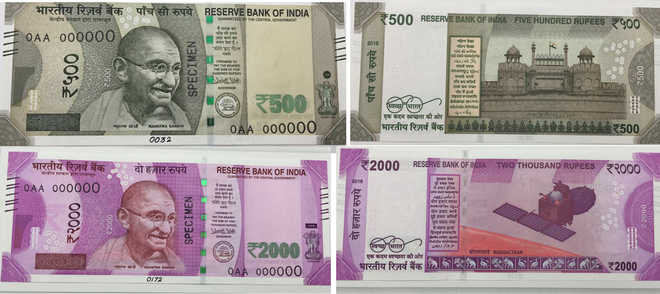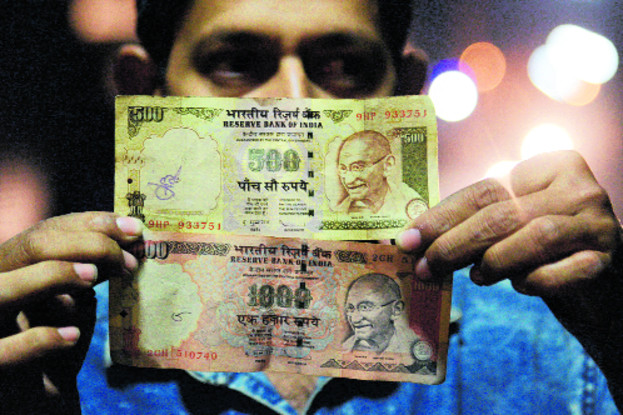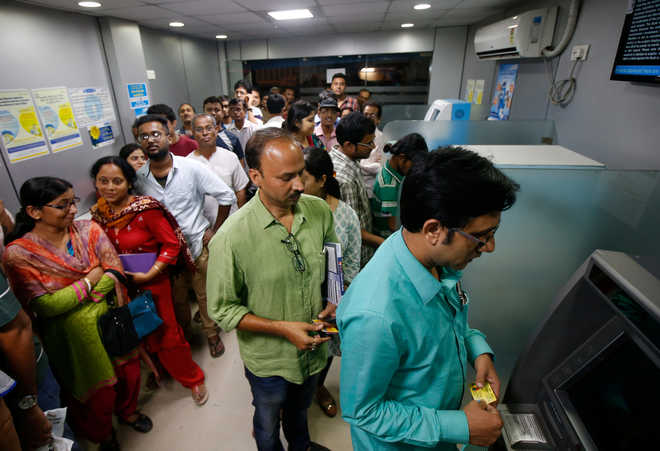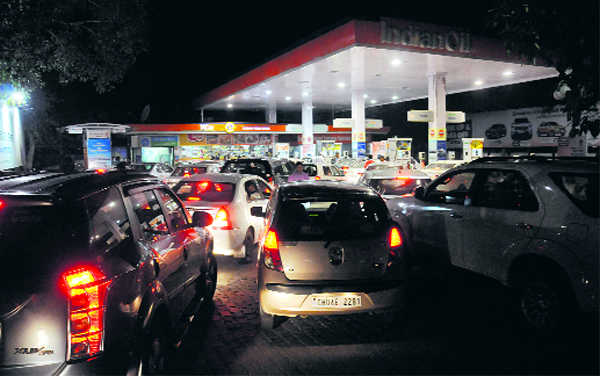


KV Prasad
Tribune News Service
New Delhi, November 8
Aimed at eradicating black money and corruption in the country, Prime Minister Narendra Modi today announced that Rs 500 and Rs 1,000 notes ceased to be legal tender from November 8 midnight. The Reserve Bank of India would issue new Rs 500 and Rs 2,000 notes in due course, he said in an emergency address to the nation, that was preceded by a meeting with top Cabinet Ministers, including the Home Minister and the Finance Minister and the National Security Adviser.The last time India undertook such a measure was during the Janata Party government of Morarji Desai which did away with the Rs 1,000 note. It took at least two decades for the government to re-introduce currency of a higher denomination.For those who have earned money legally, the old notes can be deposited in banks between November 10 and December 30 by producing PAN, Aadhaar or voter card. The money can then be withdrawn. The banks will limit the withdrawal transactions to Rs 10,000 per day and Rs 20,000 per week. The ATM withdrawal limit will be Rs 2,000. Banks will be closed tomorrow while ATMs will not function for two days. The old notes can also be converted through post offices and sub-post offices during the 50-day period. On humanitarian grounds, the old notes will be accepted in hospitals, by the airlines and road and rail transport till November 11. Essential facilities, including crematoriums, will accept the old notes till the next three days.The PM said when his government came to power, the country’s economy was floundering and now it was being seen as a bright spot by international institutions, including the International Monetary Fund. He said corruption and black money had made deep roots in the country and in global ranking, India was rated high. Stating that specific classes of people, including those in high positions, were behind corruption and generation of black money, the PM said the common man was honest and hard working. The PM cited several instances of an honest taxi or auto driver returning valuables to their customers and hoped people would contribute in this ‘mahayagya’ to tackle corruption and black money in the country.Citing that corruption and terrorism were affecting the country’s vitals, he said counterfeit currency was being pushed into the country from across the border to finance terror. Hawala was another form through which corruption and black money was being utilised to move such ill-gotten money. The government, he said, had taken several steps to tackle the menace and so far unearthed Rs 1.25 lakh crore.
50-day window for depositsOld currency notes can be deposited in banks between November 10 and December 30. Withdrawal transactions fixed at Rs 10,000 per day and Rs 20,000 per week. The ATM withdrawal limit has been fixed at Rs 2,000Banks shut today, ATMs for 2 daysBanks will be closed on Wednesday while ATMs will be shut for two days. Old notes can be deposited in post offices and sub-post offices during the 50-day period. There is no limit on the money depositedSome concessions till Nov 11On humanitarian grounds, old notes will be accepted in hospitals by the airlines and road and rail transport till November 11. Essential facilities, including crematoriums, will accept the old notes till the next three days Common man needn’t fear: GovtPM says specific classes of people, including those in high positions, are behind corruption and generation of black money and that the honest and hard working common man has nothing to fear
What it means for you
What’s valid
All coins and lower-denomination notesRs 100, Rs 50, Rs 20, Rs 10, Rs 5, Rs 2 and Rs 1What to do with existing currency
- 50-day window (November 10 to December 30) has been left open to deposit any amount in bank accounts
- From November 10 to 24, it can be exchanged with smaller/new currency at banks, post offices after producing valid IDs like PAN, Aadhaar and voter’s card with a daily cap of Rs 4,000
- From November 10, new Rs 500 and Rs 2,000 notes with greater security features to be circulated
- From December 30 to March 31, final chance to deposit invalid currency in designated RBI offices after filling out declaration form along with proof and reasons
Limit on withdrawals
ATMs: Rs 2,000/day
Banks: Rs 10,000/day; Rs 20,000/weekNo cap on cashless transactions
- No restrictions on non-cash payments by cheques, demand drafts, debit/credit cards, e-fund transfers
- Those with medical prescription can buy medicines from chemists with old notes till November 11
- Fuel stations and retail outlets (kendriya bhandar) to accept old notes till Nov 11, but with customer record
Quotes
This is a financial chaos and disaster let loose on the common man. It’s a heartless and ill-conceived blow to the common people and the middle class in the fake name of anti-corruption. — Mamata Banerjee, TMC chiefModern-day Tughlaq has thrown a nuclear trident at poor people of India. Rs 1,000 of today is what Rs 100 was 20 years back. This is insanity. — Manish Tewari, Cong leaderDemonetising high denomination notes can be an effective means to check accumulation of wealth in cash. The government has taken a measure targeting the heart of the black cash economy. — Naushad Forbes, CII presiden
It’s bold: Pranab
- New Delhi: President Pranab Mukherjee welcomed the move as a bold step that would help unearth unaccounted money as well as counterfeit currency. The President called upon the people not to panic, to follow the government’s guidelines and to avail of the opportunity provided by the government to exchange notes of Rs 1,000 and 500 denomination for new legal tender. — PTI
Rs 100 hot property
- Mumbai: The humble Rs 100 bill had several takers on an otherwise normal weekday evening in the financial capital tonight, even as police had to be deployed outside ATMs to control the crowd waiting eagerly to get their hands on the banknote. There was a beeline to acquire the “hottest commodity” or dispose of the high value Rs 500 and Rs 1,000 bank notes, which will become illegal tender at midnight. — PTI
In circulation now
- 1,650 crorenotes of Rs 500
- 670 crorenotes of Rs 1,000
Full text of govt statement on currency withdrawal

People wait to withdraw and deposit their money at an ATM kiosk in Kolkata, India, November 8, 2016. Reuters
Tribune News Service
Full text of the statement released by the Department of Economic Affairs, Ministry of Finance, on Tuesday regarding the withdrawal of Rs 1,000 and Rs 500 denomination notes and introduction of new Rs 500 and Rs 2,000 notes:1. With a view to curbing financing of terrorism through the proceeds of Fake Indian Currency Notes (FICN) and use of such funds for subversive activities such as espionage, smuggling of arms, drugs and other contrabands into India, and for eliminating Black Money which casts a long shadow of parallel economy on our real economy, it has been decided to cancel the legal tender character of the High Denomination bank notes of Rs.500 and Rs.1000 denominations issued by RBI till now. This will take effect from the expiry of the 8th November, 2016.(Follow The Tribune on Facebook; and Twitter @thetribunechd)2. Fake Indian Currency Notes (FICN) in circulation in these denominations are comparatively larger as compared to those in other denominations. For a common person, the fake notes look similar to genuine notes. Use of FICN facilitates financing of terrorism and drug trafficking. Use of high denomination notes for storage of unaccounted wealth has been evident from cash recoveries made by law enforcement agencies from time to time. High denomination notes are known to facilitate generation of black money. In this connection, it may be noted that while the total number of bank notes in circulation rose by 40% between 2011 and 2016, the increase in number of notes of Rs.500/- denomination was 76% and for Rs.1,000/- denomination was 109% during this period. New Series bank notes of Rs.500/- and Rs.2,000/- denominations will be introduced for circulation from 10th November, 2016. Infusion of Rs.2,000/- bank notes will be monitored and regulated by RBI. Introduction of new series of banknotes which will be distinctly different from the current ones in terms of look, design, size and colour has been planned.3. The World Bank in July, 2010 estimated the size of the shadow economy forIndia at 20.7% of the GDP in 1999 and rising to 23.2% in 2007. There are similar estimates made by other Indian and international agencies. A parallel shadow economy corrodes and eats into the vitals of the country’s economy. It generates inflation which adversely affects the poor and the middle classes more than others. It deprives Government of its legitimate revenues which could have been otherwise used for welfare and development activities. 4. In the last two years, the Government has taken a number of steps to curb the menace of black money in the economy including setting up of a Special Investigation Team (SIT); enacting a law regarding undisclosed foreign income and assets; amending the Double Taxation Avoidance Agreement between India and Mauritius and India and Cyprus; reaching an understanding with Switzerland for getting information on Bank accounts held by Indians with HSBC; encouraging the use of non-cash and digital payments; amending the Benami Transactions Act; and implementing the Income Declaration Scheme 2016.5. In order to implement the above decisions of the Government and keeping in view the need to minimise inconvenience to the public, the following operational guidelines have been issued:-(i) Old High Denomination Bank Notes may be deposited by individuals/persons into their bank accounts and/or exchanged in bank branches or Issue Offices of RBI till the close of business hours on 30th December, 2016.(ii) Old High Denomination Bank Notes of aggregate value of Rs.4,000/- only or below held by a person can be exchanged by him/her at any bank branch or Issue Office of Reserve Bank of India for any denomination of bank notes having legal tender character, provided a Requisition Slip as per format to be specified by RBI is presented with proof of identity and along with the Old High Denomination Bank Notes. Similar facilities will also be made available in Post Offices.(iii) The limit of Rs.4,000/- for exchanging Old High Denomination Bank Notes at bank branches or at issue offices of Reserve Bank of India will be reviewed after 15 days and appropriate notification issued, as may be necessary.(iv) There will not be any limit on the quantity or value of Old High Denomination Bank Notes to be credited to the account of the tenderer maintained with the bank, where the Old High Denomination Bank Notes are tendered. However, in accounts where compliance with extant Know Your Customer (KYC) norms is not complete, a maximum value of Rs.50,000/- of Old High Denomination Bank Notes can be deposited.(v) The equivalent value of the Old High Denomination Bank Notes tendered can be credited to an account maintained by the tenderer at any bank in accordance with standard banking procedure and on production of valid proof of Identity.(vi) The equivalent value of the Old High Denomination Bank Notes tendered can be credited to a third party account, provided specific authorisation therefor accorded by the said account holder is presented to the bank, following standard banking procedure and on production of valid proof of Identity of the person actually tendering.(vii) Cash withdrawal from a bank account, over the counter will be restricted to Rs.10,000/- subject to an overall limit of Rs. 20,000/- in a week for the first fortnight, i.e., until the end of business hours on November 24, 2016.(viii) There will be no restriction on the use of any non-cash method of operating the account which will include cheques, demand drafts, credit/debit cards, mobile wallets and electronic fund transfer mechanisms.(ix) Withdrawal from ATMs would be restricted to Rs.2,000 per day per card up to November 18, 2016. The limit will be raised to Rs.4,000 per day per card from November 19, 2016 onwards.(x) For those who are unable to exchange their Old High Denomination Bank Notes or deposit the same in their bank accounts on or before December 30, 2016, an opportunity will be given to them to do so at specified offices of the RBI on later dates along with necessary documentation as may be specified by the Reserve Bank of India.(xi) Instruction is also being issued for closure of banks and Government Treasuries, on 9th November, 2016.(xii) In addition, all ATMs, Cash Deposit Machines, Cash Recyclers and any other machine used for receipt and payment of cash will remain shut on 9th and 10th November, 2016.(xiii) The bank branches and Government Treasuries will function from 10th November, 2016.(xiv) To avoid inconvenience to the public for the first 72 Hours, Old High Denomination Bank Notes will continue to be accepted at Government Hospitals and pharmacies in these hospitals/Railway ticketing counters/ticket counters of Government/Public Sector Undertaking buses and airline ticketing counters at airports; for purchases at consumer co-operative societies, at milk booths, at crematoria/burial grounds, at petrol/diesel/gas stations of Public Sector Oil Marketing Companies and for arriving and departing passengers at international airports and for foreign tourists to exchange foreign currency at airports up to a specified amount.6. The relevant Notifications are available in the website of Finance Ministry(http://finmin.nic.in). Further details including Frequently Asked Questions (FAQs) are available on the website of the Reserve Bank of India (https://www.rbi.org.in).
Traders shut door on Rs 500, Rs1,000 notes

Long queues of vehicles at a petrol pump in Sector 33, Chandigarh, on Tuesday night. Tribune photo: Pradeep Tewari
Rajinder Nagarkoti
Tribune News Service
Chandigarh, November 8
As Prime Minister Narendra Modi announced to do away with the Rs 500 and Rs 1,000 currency notes from midnight on Tuesday, a majority of the city traders immediately stopped accepting the Rs 500 and Rs 1,000 notes.Charanjiv Singh, chairman of the Chandigarh Beopar Mandal, said they would hold a meeting on the issue tomorrow, but most traders had stopped taking the Rs 500 and Rs 1,000 currency notes from tonight.Sanjiv Mahajan, a cloth merchant in Sector 17, said he had issued directions to the staff over the phone not to accept Rs 500 and Rs 1,000 notes. Our shop will only accept payment through credit or debit cards, he said.Echoing similar views, another Sector 17 trader, Pawan Gulati, said with this decision, the sale would immediately dip by 50 to 60 per cent. They would also not accept the Rs 500 and Rs 1,000 currency notes, he said.Chander Verma, owner of a furniture store in the Industrial Area, Phase II, said it was like an emergency situation. Our store will also not accept Rs 500 and Rs 1,000 currency notes, he said.“The government should have given some time before implementing the orders. It is like dictatorship,” he said.Property dealers and taxi operators will also not accept Rs 500 and Rs 1,000 currency notes. Raj Kumar Pal, president, Property Consultants Association, said they would not accept Rs 500 and Rs 1,000 notes. “The decision taken by the Modi government is a good step,” he said.Shiv Kumar Sharma, a taxi operator, said immediately after Modi’s announcement, he told his drivers not to accept the Rs 500 and Rs 1,000 currency notes. Dalip Singh, a vendor in Sector 22, said they would accept the Rs 500 and Rs 1,000 currency notes only till the time the weekly limit of Rs 20,000 is reached.
Shopkeepers to be hit
The decision will majorly hit shopkeepers of the Sector 26 grain market, the Sector 22 Shastri Market, the Sector 15 Patel Market and the Sector 19 Sadar Bazaar. As a majority of the transactions take place without any receipt, the decision will hit them hard.Guest houses seek payments in Rs100 denominationEven guest house owners in villages in Chandigarh such as Burail, Kajheri and Attawa have stopped taking the Rs 500 and Rs 1,000 currency notes from guests. Jagdish Bhandari, a guest house owner, said they were giving rooms to only those customers who were ready to make payment in Rs 100 currency notes.QuotesIt is a huge surgical strike on black money by Prime Minister Narendra Modi to save the country. Modi has once again proved his 56 inch ka seena. —Sanjay Tandon, City BJP PresidentPM Narendra Modi has once again proved that he is capable of taking bold decisions whether the issue is concerning the security of the country or dealing with Pakistan or black money. No Prime Minister has ever taken such bold decisions. —Satya Pal Jain, Former MPDemonetising currency notes without a three-four day notice will affect people who are without debit and credit cards, especially those admitted to private hospitals. Facsimile of the new Rs 2,000 note was in the social media. Who leaked this and why? Will it not encourage black money again? —Pawan Kumar Bansal, Former Union MinisterThere should be a real fight against black money. With this sudden decision, the middle class and small traders will be the most affected. There is panic among residents after the decision. —Pardeep Chhabra, City Congress President


